Valentina Mele
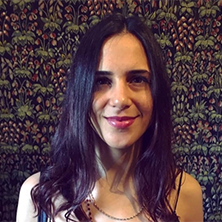 Valentina Mele was the Alberto Institute Visiting fellow for the spring of 2024. Valentina
received her B.A. in Italian Literature and her M.A. in Philology from the Università
degli Studi di Padova in 2015, and her Ph.D. in Medieval and Modern Languages from
the University of Cambridge in 2020. More recently, Valentina has been IRC Postdoctoral
Fellow at University College Cork and British Academy Postdoctoral Fellow at the School
of Languages, Cultures and Societies University of Leeds. Her main research focus
is on the intersections between Italian, English and American literature, and she
works on the reception of Dante in nineteenth and twentieth century Anglo-American
poetry. At the Alberto Institute she delivered a lecture on “Mistakenly passed for
a man’s work”. Twentieth-century Women translators of the Commedia in English,” in
which she examined the reception of two English translations of Dante’s Commedia,
published in the early decades of the 20th century. Both translations were produced
by two women who both were mistakenly attributed to male translators.
Valentina Mele was the Alberto Institute Visiting fellow for the spring of 2024. Valentina
received her B.A. in Italian Literature and her M.A. in Philology from the Università
degli Studi di Padova in 2015, and her Ph.D. in Medieval and Modern Languages from
the University of Cambridge in 2020. More recently, Valentina has been IRC Postdoctoral
Fellow at University College Cork and British Academy Postdoctoral Fellow at the School
of Languages, Cultures and Societies University of Leeds. Her main research focus
is on the intersections between Italian, English and American literature, and she
works on the reception of Dante in nineteenth and twentieth century Anglo-American
poetry. At the Alberto Institute she delivered a lecture on “Mistakenly passed for
a man’s work”. Twentieth-century Women translators of the Commedia in English,” in
which she examined the reception of two English translations of Dante’s Commedia,
published in the early decades of the 20th century. Both translations were produced
by two women who both were mistakenly attributed to male translators.
Bianca Rita Cataldi
 Bianca Rita Cataldi was chosen for the Alberto Institute visiting fellowship for the
spring of 2023. Bianca completed her Ph.D. in Italian Studies at University College
Dublin, where she is a teaching fellow and occasional lecturer in Italian, and a resident
scholar at UCD Humanities Institute. She is interested in comparative female writing
and has published widely about narratives of labour, alienation and factory utopias
in twentieth- and twenty-first-century Italian literature. She is a postgraduate representative
for SIS – Society of Italian Studies and the co-founder and general editor of the
SIS Postgraduate journal Notes in Italian Studies.
Bianca Rita Cataldi was chosen for the Alberto Institute visiting fellowship for the
spring of 2023. Bianca completed her Ph.D. in Italian Studies at University College
Dublin, where she is a teaching fellow and occasional lecturer in Italian, and a resident
scholar at UCD Humanities Institute. She is interested in comparative female writing
and has published widely about narratives of labour, alienation and factory utopias
in twentieth- and twenty-first-century Italian literature. She is a postgraduate representative
for SIS – Society of Italian Studies and the co-founder and general editor of the
SIS Postgraduate journal Notes in Italian Studies.
Alberica Bazzoni
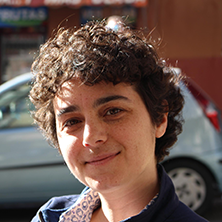 Alberica Bazzoni was chosen for the Alberto Institute visiting fellowship for the
Fall of 2019. Alberica Bazzoni is British Academy Postdoctoral Fellow at the University
of Warwick, working on a project entitled 'The Gender of Literature. Italian Women
Writers and the Literary Canon.'
Alberica Bazzoni was chosen for the Alberto Institute visiting fellowship for the
Fall of 2019. Alberica Bazzoni is British Academy Postdoctoral Fellow at the University
of Warwick, working on a project entitled 'The Gender of Literature. Italian Women
Writers and the Literary Canon.'
After graduating from the University of Milan, she completed her MPhil and PhD at
the University of Oxford, where she then taught as Lector and Lecturer in Italian
language and literature. She is the author of Writing for Freedom: Body, Identity
and Freedom in Goliarda Sapienza’s Narrative (Peter Lang, 2018), which won the ‘2015
Peter Lang Young Scholar Competition in Women's Studies', and the co-editor of Goliarda Sapienza in Context: Intertextual Relationships with Italian and European
Culture (Fairleigh Dickinson University Press, 2016).
Her research interests lie in the fields of Modern Italian Literature, Gender Studies
and Sociology of Culture, especially on themes of power, freedom, subjectivity and
performativity. She has published articles and chapters on 19th and 20th-century Italian
writers – such as Nievo, Pirandello, Morante and Ortese – literary theory, and queer-feminist
theory and activism. She is currently working on her second monograph, tentatively
titled "The Italian Literary System: Power and Margins. A Gender View," and co-editing
the interdisciplinary volume Gender and Authority Across Disciplines, Space and Time (Palgrave Macmillan, 2020).
At Seton Hall, she will conduct research on the Italian literary landscape in the
second half of the 19th century, looking in particular at the position of the novel
and the status of women writers, and on the reception of women writers in University
syllabi in the US. At Seton Hall, she has given a lecture at the Alberto Institute
on 'The Italian Literary System Today and the Construction of Literary Value: A Gender
Perspective.'
Patrizia Sambuco
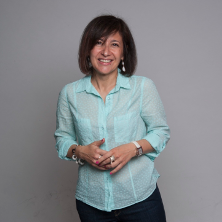 Patrizia Sambuco was the Alberto Italian Studies Institute Visiting Fellow in the
fall of 2018. She received her Laurea in lingue e letterature moderne from the University
of Bologna in Italy, and her M.A. and Ph.D. from the University of Hull in the UK.
She held teaching positions at the University of Bristol and the University of St
Andrews in the UK and was Lecturer and Senior Lecturer in Italian Studies at Monash
University in Australia. She is the author of Corporeal Bonds: the Daughter-Mother
Relationship in 20th-Century Italian Women’s Writing (University of Toronto Press,
2012) published in Italian with the title Corpi e linguaggi (Il Poligrafo, 2014),
as well as editor of Italian Women Writers 1800-2000 (Fairleigh Dickinson University
Press, 2015) and Transmissions of Memory: Echoes, Traumas and Nostalgia in Post-Wold
War II Italian Culture (FDUP, 2018).
Patrizia Sambuco was the Alberto Italian Studies Institute Visiting Fellow in the
fall of 2018. She received her Laurea in lingue e letterature moderne from the University
of Bologna in Italy, and her M.A. and Ph.D. from the University of Hull in the UK.
She held teaching positions at the University of Bristol and the University of St
Andrews in the UK and was Lecturer and Senior Lecturer in Italian Studies at Monash
University in Australia. She is the author of Corporeal Bonds: the Daughter-Mother
Relationship in 20th-Century Italian Women’s Writing (University of Toronto Press,
2012) published in Italian with the title Corpi e linguaggi (Il Poligrafo, 2014),
as well as editor of Italian Women Writers 1800-2000 (Fairleigh Dickinson University
Press, 2015) and Transmissions of Memory: Echoes, Traumas and Nostalgia in Post-Wold
War II Italian Culture (FDUP, 2018).
At Seton Hall, through the analysis of testimonies, unpublished materials and documents
on American food policies, she will be researching on the interactions and influence
of American army, society and culture on Italian alimentary imagination during WWII.
This research is part of a wider project and of her upcoming second monograph. At
Seton Hall she will be lecturing on ‘Eating Up the Journey: Pina Ballario’s Travel
Writing in the 1930s’, ‘Gendered Naples in Elena Ferrante’s Troubling Love’, and ‘The
Abruzzi of Donatella Di Pietrantonio’.
Margherita Ganeri
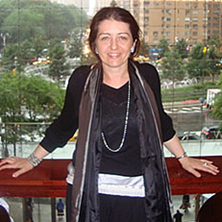 Margherita Ganeri was the La Motta Chair Visiting Fellow in March 2018. She is Professor
of Modern and Contemporary Italian Literature at the University of Calabria. She is
the author of several books, among which, The Italian America. Epos and Storytelling in Helen Barolini (International Mimesis, 2015), Ritagli critici. Sulla letteratura italiana contemporanea (Aracne, 2012), L'Europa in Sicilia. Saggi su Federico De Roberto (Le Monnier, 2005), Pirandello romanziere (Rubettino, 2001), Il romanzo storico di György Lukács: per una fondazione politica del genere letterario (Vecchiarelli, 1998). She is co-director of the «Italian Diaspora Studies Summer Seminar» (a three weeks joint program with the John D. Calandra Institute) and the founder
and coordinator of the Master-of-Arts in Philology, curriculum Italian Studies, for
international students. She has lectured at Università Roma Tre, University of Notre
Dame Rome Global Gateway in Rome, Università per stranieri in Perugia, J. D. Calandra
Institute, Queens College, CUNY, New York, and Université d’Aix-Marseille, Maison
de la Recherche. Aix-en-Provence, in France. At Seton Hall she will be researching
for her new project on "Maria Mazziotti Gillan and the Italian American Women Writers
of New Jersey" and will be lecturing on "Voyage to Calabria. The Southern Question
through the Representation of the Region in Selected Pages of Travelers and Local
Writers" and "Violence against Women in the Italian Novel: Persistence and Change
in the Status of Women through the Selected Pages of Aleramo, Banti, Morante, Ferrante
and Scego."
Margherita Ganeri was the La Motta Chair Visiting Fellow in March 2018. She is Professor
of Modern and Contemporary Italian Literature at the University of Calabria. She is
the author of several books, among which, The Italian America. Epos and Storytelling in Helen Barolini (International Mimesis, 2015), Ritagli critici. Sulla letteratura italiana contemporanea (Aracne, 2012), L'Europa in Sicilia. Saggi su Federico De Roberto (Le Monnier, 2005), Pirandello romanziere (Rubettino, 2001), Il romanzo storico di György Lukács: per una fondazione politica del genere letterario (Vecchiarelli, 1998). She is co-director of the «Italian Diaspora Studies Summer Seminar» (a three weeks joint program with the John D. Calandra Institute) and the founder
and coordinator of the Master-of-Arts in Philology, curriculum Italian Studies, for
international students. She has lectured at Università Roma Tre, University of Notre
Dame Rome Global Gateway in Rome, Università per stranieri in Perugia, J. D. Calandra
Institute, Queens College, CUNY, New York, and Université d’Aix-Marseille, Maison
de la Recherche. Aix-en-Provence, in France. At Seton Hall she will be researching
for her new project on "Maria Mazziotti Gillan and the Italian American Women Writers
of New Jersey" and will be lecturing on "Voyage to Calabria. The Southern Question
through the Representation of the Region in Selected Pages of Travelers and Local
Writers" and "Violence against Women in the Italian Novel: Persistence and Change
in the Status of Women through the Selected Pages of Aleramo, Banti, Morante, Ferrante
and Scego."
Giuseppe Catozzella
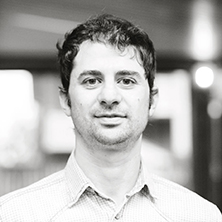 Giuseppe Catozzella was the Alberto Italian Studies Visiting Fellow in October 2017.
He is the author of several volumes of short stories and novels, among which Il ciclo di vita del pesce (Rizzoli Granta 2011), Fuego (Feltrinelli Zoom 2012), Espianti (Transeuropa 2008), Alveare (Rizzoli 2011; Feltrinelli 2014), Il grande futuro (Feltrinelli 2016) and Non dirmi che hai paura (Feltrinelli 2014) based on the true story of a Somalian athlete, Saamiya Yusuf Omar,
who participated in the Olympics of Beijing but tragically died soon after as she
was trying to cross the Mediterranean to reach Europe. The book won the prestigious
literary prize Premio Strega Giovani, was translated into many foreign languages and
was made into a documentary film in 2015. He also works as a journalist and collaborates
with major Italian national newspapers such as La Repubblica, L'espresso and Il Fatto quotidiano. He has been nominated by the UN as Goodwill Ambassador (UNHCR) for bringing awareness about the plight of refugees. At Seton Hall he will researching
for a project based on Emanuel Carnevali, a little-known Italian poet who moved to
the United States in the early 1900s and wrote poems in English which were praised
by literary figures such as Max Eastman, Ezra Pound, Robert McAlmon, e William Carlos
Williams and which inspired Sherwood Anderson for his short story "An Italian poet
in America." Giuseppe Catozzella will also be lecturing on the relationship between
literature and reality and on writing his novel Non dirmi che hai paura.
Giuseppe Catozzella was the Alberto Italian Studies Visiting Fellow in October 2017.
He is the author of several volumes of short stories and novels, among which Il ciclo di vita del pesce (Rizzoli Granta 2011), Fuego (Feltrinelli Zoom 2012), Espianti (Transeuropa 2008), Alveare (Rizzoli 2011; Feltrinelli 2014), Il grande futuro (Feltrinelli 2016) and Non dirmi che hai paura (Feltrinelli 2014) based on the true story of a Somalian athlete, Saamiya Yusuf Omar,
who participated in the Olympics of Beijing but tragically died soon after as she
was trying to cross the Mediterranean to reach Europe. The book won the prestigious
literary prize Premio Strega Giovani, was translated into many foreign languages and
was made into a documentary film in 2015. He also works as a journalist and collaborates
with major Italian national newspapers such as La Repubblica, L'espresso and Il Fatto quotidiano. He has been nominated by the UN as Goodwill Ambassador (UNHCR) for bringing awareness about the plight of refugees. At Seton Hall he will researching
for a project based on Emanuel Carnevali, a little-known Italian poet who moved to
the United States in the early 1900s and wrote poems in English which were praised
by literary figures such as Max Eastman, Ezra Pound, Robert McAlmon, e William Carlos
Williams and which inspired Sherwood Anderson for his short story "An Italian poet
in America." Giuseppe Catozzella will also be lecturing on the relationship between
literature and reality and on writing his novel Non dirmi che hai paura.
Ilaria Poerio
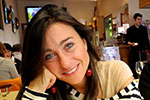 Ilaria Poerio was the La Motta Visiting Fellow in Italian Studies in the Fall of 2016.
She received her Ph.D. in Italian Studies from the University of Reading in 2015.
She has recently published A scuola di dissenso: Storie di resistenza al confino di polizia (1926-43)(Carocci, 2016); Postcards from Italy. Ventanni di berlusconismo sulla stampa britannica (Storia e problemi contemporanei n.64, 2013) and she has coauthored Vento del Sud. Gli antifascisti meridionali nella guerra di Spagna (Istituto Ugo Arcuri, 2007). Her research interests include Fascism, Antifascism
and political violence. At Seton Hall, Dr. Poerio conducted a preliminary study on
the cult of San Gennaro in the Italian-American communities of New Jersey and New
York State, and the role it played in establishing not only a religious but also cultural
identity, as one would expect both in the Old Country and the New World. The topics
of her lectures at Seton Hall included "Policing Dissidence and Persecuting Otherness
in Fascist Italy," "America is a dreamy milk sea: a portrait of the Italian immigration
in Twentieth-century Italian cinema," and "Believing the Impossible: Neapolitan Identity
and the Cult of San Gennaro".
Ilaria Poerio was the La Motta Visiting Fellow in Italian Studies in the Fall of 2016.
She received her Ph.D. in Italian Studies from the University of Reading in 2015.
She has recently published A scuola di dissenso: Storie di resistenza al confino di polizia (1926-43)(Carocci, 2016); Postcards from Italy. Ventanni di berlusconismo sulla stampa britannica (Storia e problemi contemporanei n.64, 2013) and she has coauthored Vento del Sud. Gli antifascisti meridionali nella guerra di Spagna (Istituto Ugo Arcuri, 2007). Her research interests include Fascism, Antifascism
and political violence. At Seton Hall, Dr. Poerio conducted a preliminary study on
the cult of San Gennaro in the Italian-American communities of New Jersey and New
York State, and the role it played in establishing not only a religious but also cultural
identity, as one would expect both in the Old Country and the New World. The topics
of her lectures at Seton Hall included "Policing Dissidence and Persecuting Otherness
in Fascist Italy," "America is a dreamy milk sea: a portrait of the Italian immigration
in Twentieth-century Italian cinema," and "Believing the Impossible: Neapolitan Identity
and the Cult of San Gennaro".
Martina Piperno
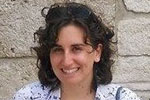 Martina Piperno was the Alberto Italian Studies Visiting Fellow in the Spring of 2017.
Originally from Rome, she just completed her Ph.D. in Italian Studies at the University
of Warwick in the UK. Her research focuses on Leopardi and in 2012 she received the
"Anna Leopardi" Award (XII Edition) for the best MA dissertation on Giacomo Leopardi,
issued by Centro Nazionale Studi Leopardiani (Recanati, Italy). She has published
several articles and is currently working on a volume titled: The Nineteenth Century in Italian Contemporary Culture: Tradition, Continuity, Legacy, edited by M. Piperno and F. Camilletti (New York: Palgrave Macmillan [forthcoming]).
At Seton Hall she will be giving a lecture at the Alberto Institute on "The Most Ancient
Wisdom of the Italians: a History in the Margins" and will teach a class to undergraduate
students on the poet Giacomo Leopardi.
Martina Piperno was the Alberto Italian Studies Visiting Fellow in the Spring of 2017.
Originally from Rome, she just completed her Ph.D. in Italian Studies at the University
of Warwick in the UK. Her research focuses on Leopardi and in 2012 she received the
"Anna Leopardi" Award (XII Edition) for the best MA dissertation on Giacomo Leopardi,
issued by Centro Nazionale Studi Leopardiani (Recanati, Italy). She has published
several articles and is currently working on a volume titled: The Nineteenth Century in Italian Contemporary Culture: Tradition, Continuity, Legacy, edited by M. Piperno and F. Camilletti (New York: Palgrave Macmillan [forthcoming]).
At Seton Hall she will be giving a lecture at the Alberto Institute on "The Most Ancient
Wisdom of the Italians: a History in the Margins" and will teach a class to undergraduate
students on the poet Giacomo Leopardi.
Rosella Merlino
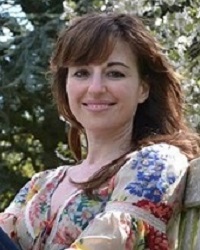 Rossella Merlino was the Visiting Fellow in Italian Studies in the Spring of 2016.
She received her M.A. in Contemporary Italian Studies from UCL in 2008 and her Ph.D.
from the University of Strathclyde in 2013, and worked as a Teaching Fellow in Italian
at the Universities of Bath and Exeter. She has recently been appointed as Lecturer
and Head of Italian at the University of Bangor. Her research focuses on the cultural
dimension of Italian organized crime, with a specific reference to the Sicilian mafia
and religion, on which she has published several articles in international journals.
At Seton Hall, she will conduct a preliminary comparative study between the memoirs
and letters written by Sicilian mafia bosses and the selected memoirs of American
mafiosi. The topics of her lectures at Seton Hall will include "The religious dimension
of the Sicilian mafia: an overview", "A comparative analysis between the Sicilian
and the American mafia", "The mafia as a 'Southern Question': apology, cultural representations,
and otherness".
Rossella Merlino was the Visiting Fellow in Italian Studies in the Spring of 2016.
She received her M.A. in Contemporary Italian Studies from UCL in 2008 and her Ph.D.
from the University of Strathclyde in 2013, and worked as a Teaching Fellow in Italian
at the Universities of Bath and Exeter. She has recently been appointed as Lecturer
and Head of Italian at the University of Bangor. Her research focuses on the cultural
dimension of Italian organized crime, with a specific reference to the Sicilian mafia
and religion, on which she has published several articles in international journals.
At Seton Hall, she will conduct a preliminary comparative study between the memoirs
and letters written by Sicilian mafia bosses and the selected memoirs of American
mafiosi. The topics of her lectures at Seton Hall will include "The religious dimension
of the Sicilian mafia: an overview", "A comparative analysis between the Sicilian
and the American mafia", "The mafia as a 'Southern Question': apology, cultural representations,
and otherness".
Kate Mitchell
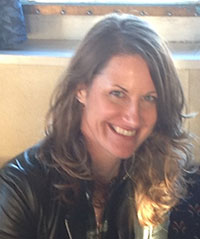 Kate Mitchell was a Visiting Fellow in Italian Studies in the Fall of 2014. She received
her Ph.D. from the University of Warwick in 2007 and worked as a Junior Research Fellow
at the University of Cambridge (Lucy Cavendish College) between 2008 and 2011. She
is Lecturer in Italian at the University of Strathclyde, Glasgow, and author of Italian Women Writers: Gender and Everyday Life in Fiction and Journalism, 1870-1910 (Toronto: University of Toronto Press) as well as co-editor of Women and Gender in Post-Unification Italy: Between Private and Public Spheres (Oxford: Peter Lang, 2013). She has published articles on Neera, La Marchesa Colombi,
Matilde Serao and Giacomo Puccini. At Seton Hall, she worked on an article on divas
and 'feminine beauty' in nineteenth-century Italian literary culture. The topics of
her lectures were 'Opera Divas and Heroines in Nineteenth-Century Italy', 'Le donne
italiane nell'Ottocento' and 'Scrittici e lettrici italiane del tardo Ottocento'.
Kate Mitchell was a Visiting Fellow in Italian Studies in the Fall of 2014. She received
her Ph.D. from the University of Warwick in 2007 and worked as a Junior Research Fellow
at the University of Cambridge (Lucy Cavendish College) between 2008 and 2011. She
is Lecturer in Italian at the University of Strathclyde, Glasgow, and author of Italian Women Writers: Gender and Everyday Life in Fiction and Journalism, 1870-1910 (Toronto: University of Toronto Press) as well as co-editor of Women and Gender in Post-Unification Italy: Between Private and Public Spheres (Oxford: Peter Lang, 2013). She has published articles on Neera, La Marchesa Colombi,
Matilde Serao and Giacomo Puccini. At Seton Hall, she worked on an article on divas
and 'feminine beauty' in nineteenth-century Italian literary culture. The topics of
her lectures were 'Opera Divas and Heroines in Nineteenth-Century Italy', 'Le donne
italiane nell'Ottocento' and 'Scrittici e lettrici italiane del tardo Ottocento'.
Jessy Carton
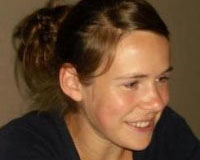 Jessy Carton was a Visiting Fellow in Italian Studies in the Fall of 2013. She received
a bachelor's and master's degree in French and Italian Linguistics and Literature
from Ghent University (Belgium). She is currently preparing a Ph.D. in Italian literature
under the supervision of professor Sabine Verhulst. The aim of her Ph.D. research
is to understand the ethos or self-presentation of the literary outsider and his anomalous
views on literature and society by means of a case study of the Italian author-journalist
Goffredo Parise (1929-1986). Jessy Carton has published articles on Raffaele La Capria,
Goffredo Parise and Ennio Flaiano in leading international journals. The topics of
her lectures at Seton Hall University include "Giorgio Bassani's Commitment: Recounting
the Tragedy of the Italian Jews in the Second World War", "Cold War in Italy: Capitalism,
Communism and Diversity in Goffredo Parise's Travel Reports" and "Rome and the Economic
Miracle: La Dolce Vita? Ennio Flaiano's Criticism of Post-War Italy".
Jessy Carton was a Visiting Fellow in Italian Studies in the Fall of 2013. She received
a bachelor's and master's degree in French and Italian Linguistics and Literature
from Ghent University (Belgium). She is currently preparing a Ph.D. in Italian literature
under the supervision of professor Sabine Verhulst. The aim of her Ph.D. research
is to understand the ethos or self-presentation of the literary outsider and his anomalous
views on literature and society by means of a case study of the Italian author-journalist
Goffredo Parise (1929-1986). Jessy Carton has published articles on Raffaele La Capria,
Goffredo Parise and Ennio Flaiano in leading international journals. The topics of
her lectures at Seton Hall University include "Giorgio Bassani's Commitment: Recounting
the Tragedy of the Italian Jews in the Second World War", "Cold War in Italy: Capitalism,
Communism and Diversity in Goffredo Parise's Travel Reports" and "Rome and the Economic
Miracle: La Dolce Vita? Ennio Flaiano's Criticism of Post-War Italy".
Federico Casari
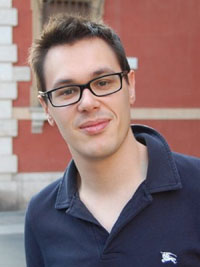 Federico Casari was Visiting Fellow in Italian Studies for the month of September,
2012. He received a B.A. in Italian Language and Literature from the University of
Bologna (Italy), and an M.A. in Italian Philology from the same university. He is
currently a third-year Ph.D. candidate in the Department of Italian at Durham University.
Supervised by Professor Carlo Caruso, his research project is designed towards the
understanding of a typically Italian genre of literary journalism, the elzeviro, and
its impact in the process of literary reporting between the second half of the nineteenth
and the beginning of the twentieth century. At Seton Hall he lectured on "America
1850-1860. How the Italians discovered the United States" and "Milano and the Making
of I promessi sposi".
Federico Casari was Visiting Fellow in Italian Studies for the month of September,
2012. He received a B.A. in Italian Language and Literature from the University of
Bologna (Italy), and an M.A. in Italian Philology from the same university. He is
currently a third-year Ph.D. candidate in the Department of Italian at Durham University.
Supervised by Professor Carlo Caruso, his research project is designed towards the
understanding of a typically Italian genre of literary journalism, the elzeviro, and
its impact in the process of literary reporting between the second half of the nineteenth
and the beginning of the twentieth century. At Seton Hall he lectured on "America
1850-1860. How the Italians discovered the United States" and "Milano and the Making
of I promessi sposi".
 Valentina Mele was the Alberto Institute Visiting fellow for the spring of 2024. Valentina
received her B.A. in Italian Literature and her M.A. in Philology from the Università
degli Studi di Padova in 2015, and her Ph.D. in Medieval and Modern Languages from
the University of Cambridge in 2020. More recently, Valentina has been IRC Postdoctoral
Fellow at University College Cork and British Academy Postdoctoral Fellow at the School
of Languages, Cultures and Societies University of Leeds. Her main research focus
is on the intersections between Italian, English and American literature, and she
works on the reception of Dante in nineteenth and twentieth century Anglo-American
poetry. At the Alberto Institute she delivered a lecture on “Mistakenly passed for
a man’s work”. Twentieth-century Women translators of the Commedia in English,” in
which she examined the reception of two English translations of Dante’s Commedia,
published in the early decades of the 20th century. Both translations were produced
by two women who both were mistakenly attributed to male translators.
Valentina Mele was the Alberto Institute Visiting fellow for the spring of 2024. Valentina
received her B.A. in Italian Literature and her M.A. in Philology from the Università
degli Studi di Padova in 2015, and her Ph.D. in Medieval and Modern Languages from
the University of Cambridge in 2020. More recently, Valentina has been IRC Postdoctoral
Fellow at University College Cork and British Academy Postdoctoral Fellow at the School
of Languages, Cultures and Societies University of Leeds. Her main research focus
is on the intersections between Italian, English and American literature, and she
works on the reception of Dante in nineteenth and twentieth century Anglo-American
poetry. At the Alberto Institute she delivered a lecture on “Mistakenly passed for
a man’s work”. Twentieth-century Women translators of the Commedia in English,” in
which she examined the reception of two English translations of Dante’s Commedia,
published in the early decades of the 20th century. Both translations were produced
by two women who both were mistakenly attributed to male translators.











